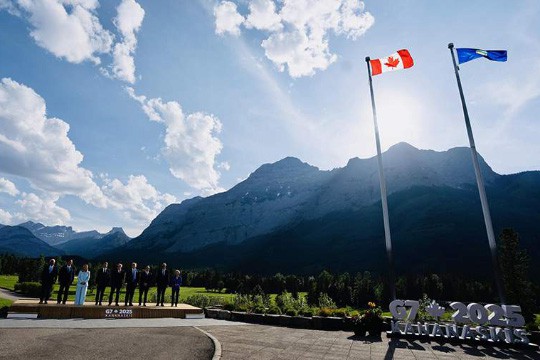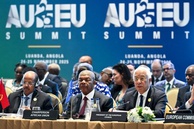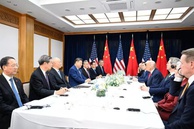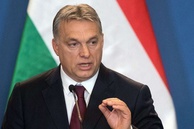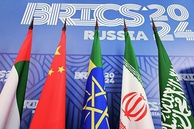The 51st summit of the Group of Seven (G7), held from June 15 to 17 at the Kananaskis ski resort in Alberta, Canada, suffered a major hiccup resulting from US President Donald Trump's early departure amid strong disagreements among members on key international issues, such as the conflicts in Ukraine and the Middle East.
Many Western experts viewed the summit not as a G7 meeting, but rather one in a "6+1" format, with The Washington Post even calling it "Six against Trump." This, I believe, is the key takeaway from the Canadian summit.
First off, the participants failed to agree on a final joint statement due to disagreements between the US and other members on issues including sanctions and the Ukrainian conflict. Instead, six statements on specific topics, rather than a single joint communique, were finally released.
Trump abruptly left the summit on Monday, departing a day early, after a dinner with other leaders, and headed back to Washington. White House Press Secretary Karoline Leavitt said that her boss had "had a great day at the summit, even signing a major trade deal with the United Kingdom and Prime Minister Keir Starmer," but departed Canada “because of what’s going on in the Middle East.” 1
After Trump's departure, on the summit's closing day on June 17, the remaining heads of state reached a consensual agreement to release several statements pertaining to the issues discussed. The G7 leaders called the Islamic Republic of Iran "a major source of regional instability and terror," but fell short of mentioning Israel's aggression against Iran. The document, published by the Canadian government, stated that resolving the "Iranian crisis" would pave the way for broader de-escalation of hostilities in the Middle East and a resolution of the situation surrounding the Gaza Strip. 2
Bloomberg described Trump's early departure as a demarche against the other G7 members. According to the agency, with Trump’s departure, the G7 lacked a common base, making the Canadian meeting one of the most unsuccessful in the last decade. It showed that the G7 is no longer a common club of interests, but rather a platform for bilateral negotiations where parties try to find common ground. Bloomberg columnist Andreas Kluth argued that the G7 no longer embodies a collective West now that the United States has largely stopped sharing the values of other members. He noted that the G7 members could not even agree on how to analyze global conflicts, let alone how to resolve them.
French President Emmanuel Macron assumed that Trump's early departure had been dictated by the need to work on a ceasefire between Israel and Iran. Trump denied this, however, accusing Macron of misrepresenting the reasons for his departure and even mocked him. Macron "mistakenly said that I left the G7 Summit, in Canada, to go back to D.C. to work on a 'cease fire' between Israel and Iran," Trump wrote of his Truth Social platform. “Wrong! He has no idea why I am now on my way to Washington, but it certainly has nothing to do with a Cease Fire. Much bigger than that. Whether purposely or not, Emmanuel always gets it wrong," Trump added.
Meanwhile, Fox News host Lawrence Jones reported on X (formerly Twitter) that Trump had instructed members of the National Security Council to wait for him in the White House Situation Room upon his return from the G7 summit. The outcome of that meeting remains largely unknown, fueling speculation about whether the US would enter a conflict with Iran alongside Israel.
Summit Goals:
When outlining the summit’s agenda ahead of the meeting, Canada’s Prime Minister Mark Carney said that the G7 would first discuss financial and military aid to Ukraine, recalling the G7's $50 billion aid agreement reached in Italy last year as a means of reaffirming the group’s continued support for Kyiv.
Secondly, the G7 (now reduced to G6) aimed to reiterate its intention to pressure Moscow into signing a ceasefire, particularly through economic pressure by lowering the price cap on Russian oil from $60 to $45 per barrel.
European Commission President Ursula von der Leyen said that since Russian tankers, including those of the so-called "shadow fleet," were largely linked to Europe, the EU could effectively enforce the price cap by, for instance, prohibiting Greek ship-owners from transporting Russian oil. She admitted, however, that growing opposition within the EU, above all from Hungary and Slovakia, which threatened to block sanctions against Russia, could veto the rejection of Russian energy imports, which would require alternative legal mechanisms.
Trump disagreed with his G7 partners, stating that the West was "losing billions of dollars" on sanctions against Russia. He also stated, much to the chagrin of the other participating leaders, that Russia’s expulsion from the G8 was a "big mistake." The lack of a common position on various issues forced Canada, left presiding over the G7 summit following Trump's early departure, to skip a full final communiqué to avoid a repeat of the 2018 Quebec summit, where Trump withdrew his signature from the joint statement.
Conclusion:
The G7 format is increasingly losing its relevance amidst rapid changes in global politics due to the absence of key players like Russia, China, and India, which significantly influence the new world order. This hamstrings the G7's ability to address numerous international problems, particularly conflicts requiring the participation of various actors.
The Canadian summit laid bare serious disagreements within the G7 on key foreign policy issues and development strategies. The US, under President Trump, demonstrated its differing vision on several issues, which it sees as being more important than those on the agenda of the Canadian summit.
Trump's statement that excluding Russia from the G8 was a mistake has had a big ripple effect as his words and actions clearly demonstrate the need for direct dialogue with major world powers, regardless of existing political disagreements.
Even though Trump's failure to meet with Ukraine’s President Volodymyr Zelenskyy prevented a joint statement on Ukraine, financial aid to Kyiv was confirmed. Western leaders had hoped to pressure Trump into taking a tougher stance against Moscow but were clearly disappointed. The obvious differences highlighted during that summit, widely seen as a failure, have underscored the degradation of "Western unity.” However, the West remains still committed to its continued confrontation with Russia and China, designating them as primary antagonists and not ruling out a military conflict. All this meaning that this is not yet "the end of history."
The views of the author are his own and may not necessarily reflect the position of the Editorial Board.
[1] Trump decided to leave the G7 summit in Canada early 17.06.2025. https://ria.ru/20250617/tramp-2023236760.html
[2] G7: settlement of the Iran-Israel crisis will help de-escalate tensions in the region 17.06.2025 https://tass.ru/mezhdunarodnaya-panorama/24238467
read more in our Telegram-channel https://t.me/The_International_Affairs

 19:17 18.06.2025 •
19:17 18.06.2025 •
